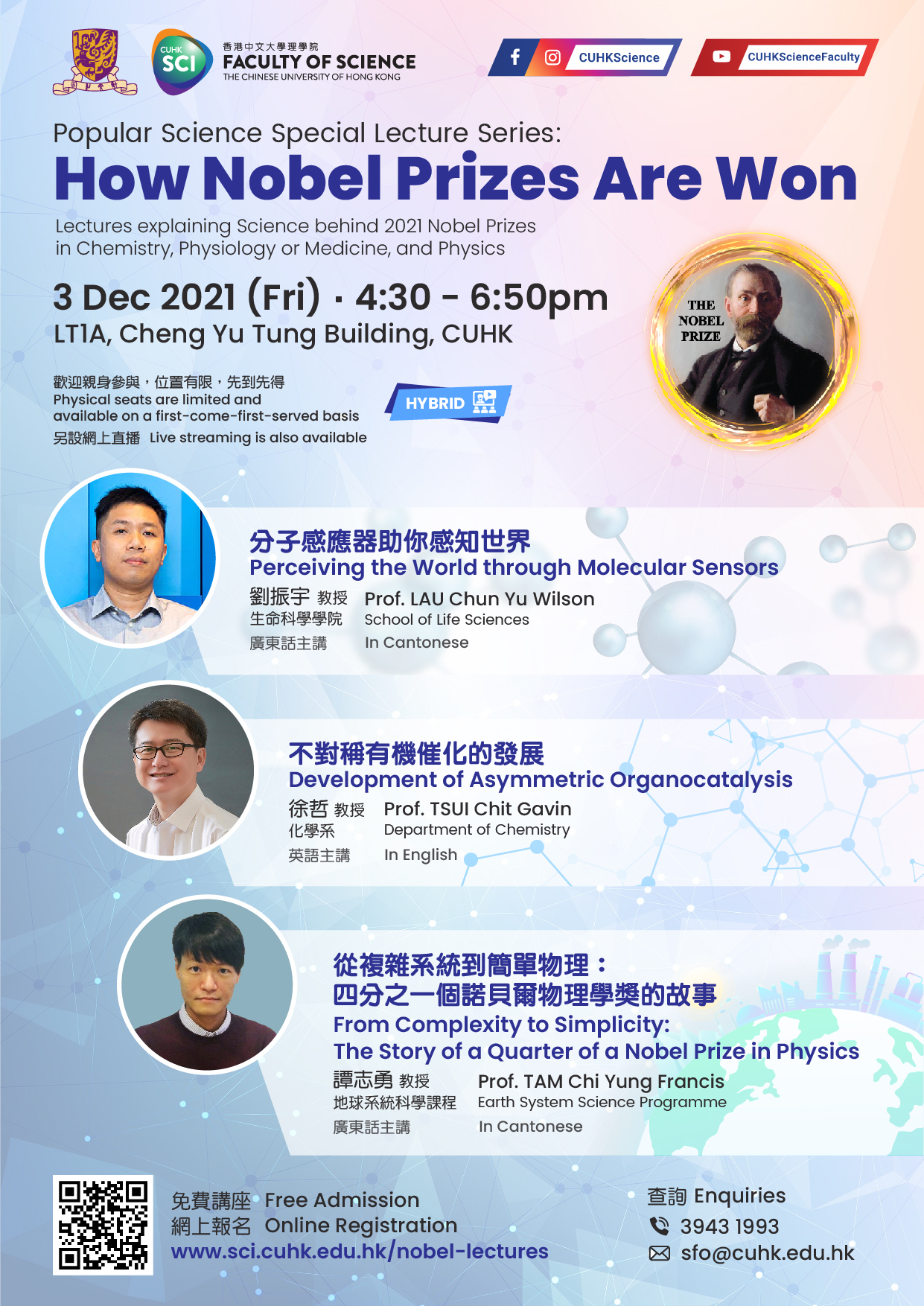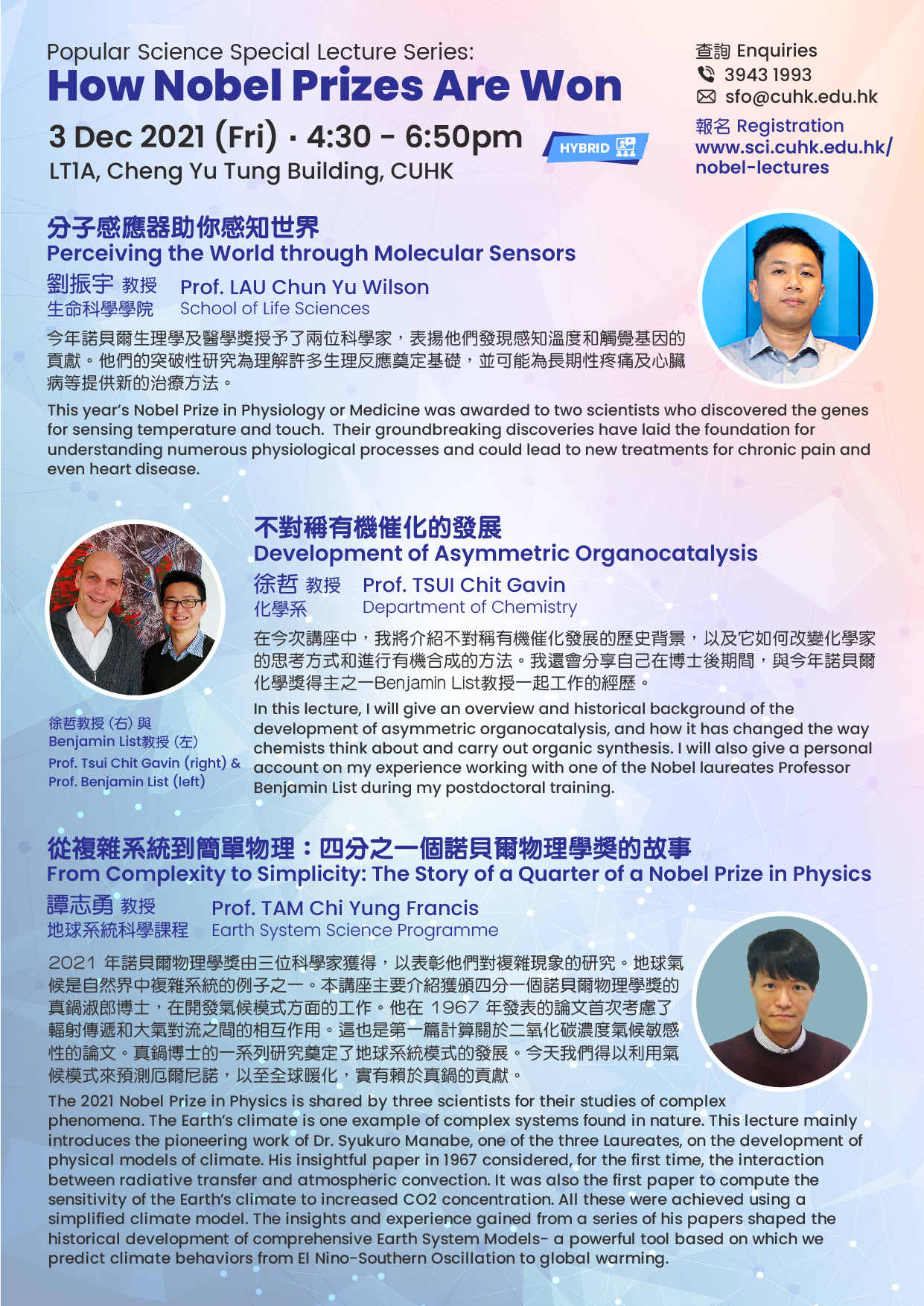Events
Popular Science Special Lecture Series: How Nobel Prizes Are Won
3 Dec 2021
4:30 p.m. – 6:50 p.m.
LT1A, Cheng Yu Tung Building, CUHK
(Physical seats are limited and available on a first-come-first-served basis; live streaming is also available)
Prof. LAU Chun Yu Wilson (School of Life Sciences)
Prof. TSUI Chit Gavin (Department of Chemistry)
Prof. TAM Chi Yung Francis (Earth System Science Programme)
On-line Registration https://bit.ly/3CkiaTs
3943 1993 / sfo@cuhk.edu.hk
The Faculty of Science of The Chinese University of Hong Kong has been dedicated to promoting science to the general public, especially to young people. In addition to our annual Popular Science Talks, where our faculty members give talks on cutting-edge topics of science, we are pleased to hold a special Popular Science Lecture Series on research that covers topics related to each year’s Nobel Prizes in Physics, Chemistry and Physiology or Medicine.
This year, the Popular Science Special Lecture Series: How Nobel Prizes Are Won will be held on 3 December 2021 (Friday).
| Date | 3 December 2021 (Friday) |
| Time | 4:30 p.m. – 6:50 p.m. |
| Venue | LT1A, Cheng Yu Tung Building, CUHK (Physical seats are limited and available on a first-come-first-served basis; live streaming is also available) |
| Registration & Deadlines |
Physical participation: 28 November 2021 (Sunday) |
| Enquiries | 3943 1993 / sfo@cuhk.edu.hk |
Lecture Series Topics:
| Talk 1 |
Perceiving the World through Molecular Sensors Prof. LAU Chun Yu Wilson (School of Life Sciences) This year’s Nobel Prize in Physiology or Medicine was awarded to two scientists who discovered the genes for sensing temperature and touch. Their groundbreaking discoveries have laid the foundation for understanding numerous physiological processes and could lead to new treatments for chronic pain and even heart disease. |
| Talk 2 |
Development of Asymmetric Organocatalysis Prof. TSUI Chit Gavin (Department of Chemistry) In this lecture, I will give an overview and historical background of the development of asymmetric organocatalysis, and how it has changed the way chemists think about and carry out organic synthesis. I will also give a personal account on my experience working with one of the Nobel laureates Professor Benjamin List during my postdoctoral training. |
| Talk 3 |
From Complexity to Simplicity: The Story of a Quarter of a Nobel Prize in Physics Prof. TAM Chi Yung Francis (Earth System Science Programme) The 2021 Nobel Prize in Physics is shared by three scientists for their studies of complex phenomena. The Earth’s climate is one example of complex systems found in nature. This lecture mainly introduces the pioneering work of Dr. Syukuro Manabe, one of the three Laureates, on the development of physical models of climate. His insightful paper in 1967 considered, for the first time, the interaction between radiative transfer and atmospheric convection. It was also the first paper to compute the sensitivity of the Earth’s climate to increased CO2 concentration. All these were achieved using a simplified climate model. The insights and experience gained from a series of his papers shaped the historical development of comprehensive Earth System Models- a powerful tool based on which we predict climate behaviors from El Nino-Southern Oscillation to global warming. |




